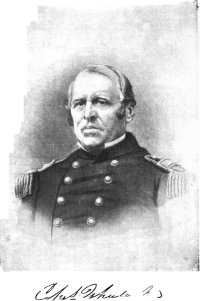Biography of Colonel Charles Wheelock
(1812 - 1865)
By Isaac Hall
 Brevet
Brigadier Gen. Charles Wheelock was born in the town of
Claremont, County of Sullivan and State of New Hampshire, on the 14th day of December,
1812. He was the son of Daniel and Lucinda Wheelock, who removed with their family when
the subject of this sketch was a mere lad and settled near the west bank of Black river,
in the town of Boonville, north-east of the village, on lands now owned and occuped by
Peter Ward and J. A. Fiske. His father was of English descent, and his mother first saw
the light on the famous battle ground of Lexington. Her maiden name was Stewart. Two of
her brothers took part in the Revolutionary War, one of whom fell at the battle of Bunker
Hill. General Wheelock was married on the 20th day of May, 1835, to Miss Lucy Jones,
daughter of Hezekiah Jones, Esq., of Boonville, N.Y., who is still living.
Brevet
Brigadier Gen. Charles Wheelock was born in the town of
Claremont, County of Sullivan and State of New Hampshire, on the 14th day of December,
1812. He was the son of Daniel and Lucinda Wheelock, who removed with their family when
the subject of this sketch was a mere lad and settled near the west bank of Black river,
in the town of Boonville, north-east of the village, on lands now owned and occuped by
Peter Ward and J. A. Fiske. His father was of English descent, and his mother first saw
the light on the famous battle ground of Lexington. Her maiden name was Stewart. Two of
her brothers took part in the Revolutionary War, one of whom fell at the battle of Bunker
Hill. General Wheelock was married on the 20th day of May, 1835, to Miss Lucy Jones,
daughter of Hezekiah Jones, Esq., of Boonville, N.Y., who is still living.
They had six children, three sons and three daughters, fiveof whom were living at the time the colonel entered the service of his country. But on the 23d of May, 1863, the family circle was broken by the death of his eldest daughter, Allie, the lovely and accomplished wife of Philip Owen, Esq., then of Boonville, but now of the firm of Owen Brothers, manufacturing of clothing, in Utica.
His eldest son, Morton D., now of Rome, was drafted in August, 1863, but having the entire charge of his father's private affairs it was deemed necessary the he should remain at home and he was represented by a substitute. The remaining children are Helen M., now the wife of Edward L Clark, of Brooklyn, Herbert H., of Cayuga, and Forrest J. Wheelock, of Boonville.
Colonel Wheelock was a resident of Boonville for a period of forty years prior to his entering the military service of the United States. Besides attending to his farm affairs for the latter twenty years of his business life, he was a stirring, energetic produce dealer, and a square and honorable man. He was a member of the New York State Militia for ten years and the last four held a captain's commission. He was offered the coloneley but declined. He was about five feet ten inches in height, of florid complexion, blue eyes, and possessed a heavy frame and strong muscular power; and his usual weight was something over two hundred pounds. He possessed a highly social nature but was a man of great determination; and was keenly sensitive in his views of right and always ready to defend them. He took a deep interest in politics and was a man of great influence with men, and a strong man in electing his favorites, but never sought or would accept office himself. General Wheelock was eminently domestic in his tastes and sympathies. No man prized more the endearments of family ties; he loved his home; his wife and children were most dear to him and he cherished their associations; however, the spark of patriotism, kindled in his bosom at the beginning, fanned into flame in his exertions in assisting to fill and forward to the seat of war, the 14th and 26th Regiments and Captain N. Hall's Cavalry Company, swelled in proportions in raising his own regiment; and finally at the zenith of his life, bore him away from the endearments to the privations, exposures and perils of the ensanguined field.
As soon as he was captured at Gettysburg, Colonel Wheelock begain to devise means of escape, which he effected, as aforementioned, on Sunday night in the darkness of the mountain pass. Soon after Wheelock's return to his regiment, he was ordered to Elmira, N.Y., with other officers of the Army of the Potomac, to take charge of, and forward conscripts. While here, the painful intelligence reached his friends, that he had been dismissed the service for approving, as alleged, fraudulent vouchers. No one acquainted with the colonel could entertain for a moment the idea that such a charge could be sustained, and this good opinion was soon confirmed by the following correspondence and orders:
WAR DEPARTMENT, Washington, D.C. September 12th, 1863
Col. Wheelock, 97th N.Y. V.:
Sir: Enclosed is the order restoring you to command, and pay from date of dismissal.
It is due to you to state that your dismissal was a mistake - inadvertance - and wrongful.
An account was presented for payment of $650.90 for subsisting recruits. This account was referred by the War Department to H. S. Olcott, Special Commissioner, about $150, and endorsing that Henry Root was the special contractor; J. P. Leslie, captain, certifying officer; and C. Wheelock, Col., the approving officer of the false and fraudulent account.
Whereas, the fact is you did not approve of the bill, but only approved of the transportation charge of $10.45, in duplicate and this charge was right.
Upon the discovery of this mistake you were at once ordered restored, and the order of dismissal revoked.
I make this statement to relieve you from the slightest imputation, in this regard, upon your character as a man, and an officer.
I am, Col., respectfully, your obedient servant,
L. C. Turner, Judge Advocate
War Department, Adjutant Generals office,
Washington, Sep. 16, 1863
WAR DEPARTMENT, Washington, D.C. September 16th, 1863
Special Order No. 431 (Extract.)
23. So much of Special Orders 416, September 12, 1863, from this office, as restores Col. C. Wheelock, 97th N.Y. Volunteers, to his command, with pay from date of dismissal, is hereby revoked, and the following is substituted:
It having been ascertained that Col. C. Wheelock, 97th New York VOlunteers, was, through some misapprehension of the facts of the case, erroneously reported for having approved a fraudulent account, he is hereby relieved from the imputation of blame in the premises, and so much of Special Orders 371, August, 20th, 1863, from this office, as dismissed him from the service for certifying to false and fraudulent accounts, is hereby revoked, and Col. Wheelock is restored to his command, with pay from date of dismissal. By order of the Secretary of War.
Col. E. D. Townsend, Assistant Adjutant General
Robert Williams, Adjutant-General.
The funeral of Brigadier General Charles Wheelock took place from the Presbyterian Church at Boonville. A special train with about 150 of the 45th Regiment went up from Utica, but owing to heavy drifts did not reach Boonville till 3 o'clock. The funeral services were already in progress. The delegation was welcomed by a local committee and the firemen of the village. Allthe stores and shops of the place were closed. The Presbyterian church was crowded by the people from all the country round about, who sincerely mourned the patriot soldier. A sermon was delivered by Rev. Mr. Manley, of Boonville, and Rev. Dr. Fowler, of Utica, paid an eloquent and appropriate tribute to the public services of the deceased. The procession was very long and imposing. It included the 45th Regiment, National Guard, the Masonic Lodge and the firemen of the village, besides a large number of citizens. At the cemetery, the ceremonies of the Masonic order were performed, and the military paid the last honors to the departed hero.
Written by Capt. Isaac Hall, a member of the Ninety-Seventh Regiment, New York Volunteers, and published as Appendix A of "History of the Ninety-Seventh Regiment New York Volunteers - Conkling Rifles", by Isaac Hall, 1890, Press of L. C. Childs & Son, Utica, NY. ISBN 0-935523-25-1. This book has been reprinted by Butternut and Blue, 3411 Northwind Road, Baltimore, Maryland 21234, and can be purchased at Amazon.com
